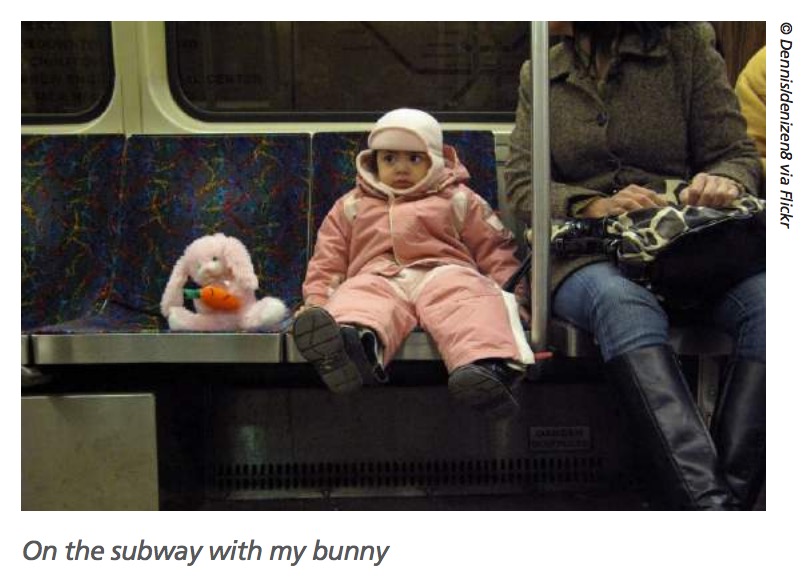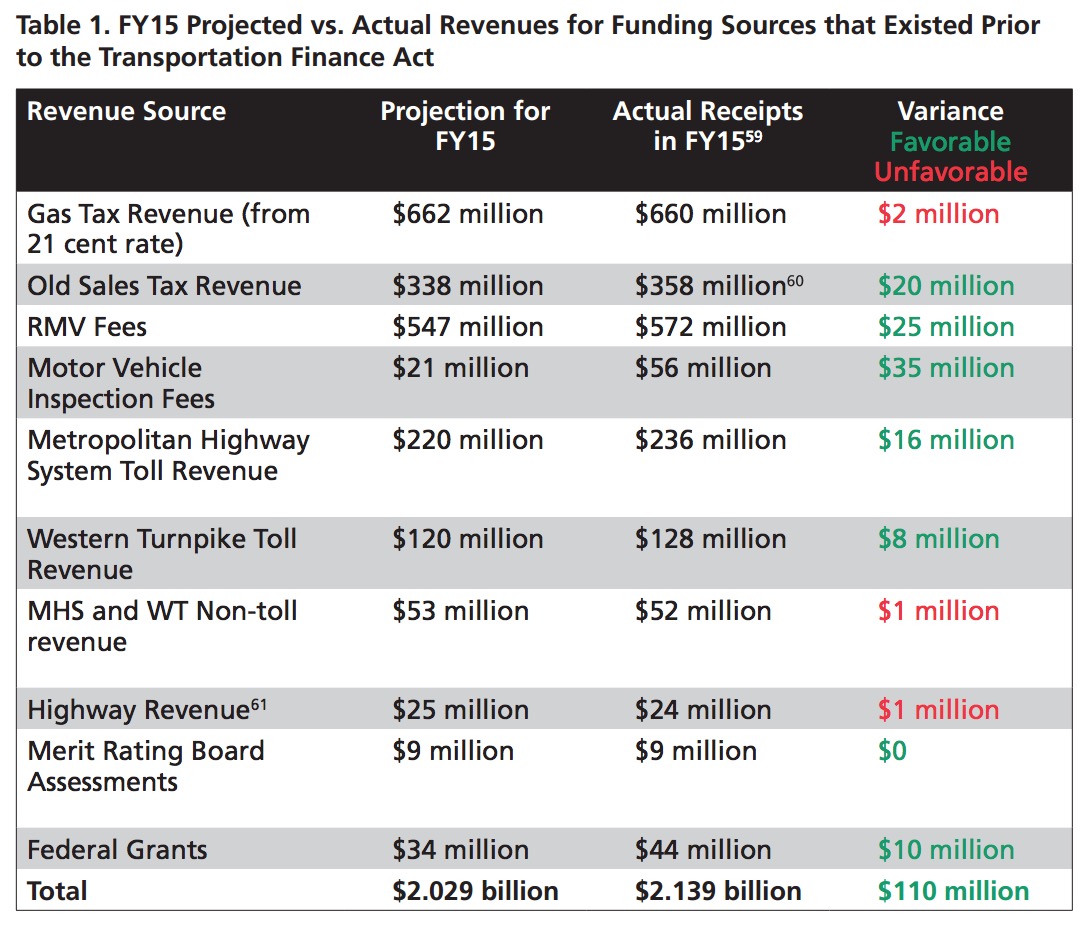TRANSPORTATION FOR MASSACHUSETTS
Keeping on Track: Our Third Progress Report on Reforming and Funding Transportation Since Passage of the Massachusetts Transportation Finance Act of 2013
 SINCE 2000, the Commonwealth has recognized and sought to address the deficiencies in its transportation infrastructure, operations, finance, and funding. Significant milestones include the Massachusetts Bay Transportation Authority (MBTA) “Forward Funding” legislation (2000), the bipartisan Transportation Finance Commission (2007), the Transportation Reform Act (2009), the Transportation Finance Act (2013), and the creation of the MBTA Fiscal and Management Control Board (2015). Sixteen years later, the problems of our transportation system persist, and transportation continues to be one of the top policy priorities for legislators and the public alike.
SINCE 2000, the Commonwealth has recognized and sought to address the deficiencies in its transportation infrastructure, operations, finance, and funding. Significant milestones include the Massachusetts Bay Transportation Authority (MBTA) “Forward Funding” legislation (2000), the bipartisan Transportation Finance Commission (2007), the Transportation Reform Act (2009), the Transportation Finance Act (2013), and the creation of the MBTA Fiscal and Management Control Board (2015). Sixteen years later, the problems of our transportation system persist, and transportation continues to be one of the top policy priorities for legislators and the public alike.
This report is the third in a series of Transportation for Massachusetts (T4MA) progress reports that keep track of how the Commonwealth is implementing the measures required by the legislature, and the impact of these efforts so far. To provide a clearer, more complete evaluation of our transportation system, this report now includes an assessment of the implementation of the 2009 Transportation Reform Act.
Keeping on Track now provides one-stop shopping for those interested in updated information about the Commonwealth’s transportation system, completed statutory requirements from two transportation laws, missed deadlines, and improvements made through new transportation system investments.
Executive Summary
Increased funds have resulted in some progress, but the Commonwealth still lacks the resources to meet the state’s critical transportation needs.
WHILE IT CAN a take a long time for transportation investments to produce actual improvements on the ground, the seeds of the Transportation Finance Act of 2013 are beginning to take root and a limited number of fruits have even been harvested. Since our last report, for example, the Massachusetts Department of Transportation (MassDOT) has made progress on improving rail service on the Knowledge Corridor by rerouting the Vermonter Amtrak service, which reduces trip times significantly, and opening up a newly-built station platform at Depot Square, which returns passenger train service to Holyoke. All-electronic tolling along the Massachusetts Turnpike, operational since October of 2016, is now saving drivers significant time.
Projects under construction, from which users will experience benefits soon, include the rehabilitation of the I-91 Viaduct in Springfield (restoration of traffic in the fall of 2017; completion in February of 2019), renovation of Springfield Union Station (opening in early 2017), and replacement of Red and Orange Line cars on the MBTA (first production of cars to be completed in 2019, all new cars will be in service by 2023).
According to MassDOT’s FY17-FY21 Capital Investment Plan, over the next five years, we can also expect increased investment in the repair and maintenance of bridges ($2.05 billion), MBTA’s Power, Facilities, and Operations ($1.08 billion), the Registry of Motor Vehicles ($120 million), and the Aeronautics Program ($278 million). All of these investments will be above those previously anticipated in MassDOT’s The Way Forward (2013).
In spite all of these achievements, however, MassDOT’s FY17-FY21 Capital Investment Plan exposes that even with increased funding from the Transportation Finance Act of 2013, the Commonwealth still lacks the resources to meet all of the state’s critical transportation needs. In the past, MassDOT and other experts have estimated that over $600 million per year over the next ten years is still needed in additional resources beyond those raised and pledged by the Transportation Finance Act of 2013. Many transportation projects previously identified by MassDOT as key repairs and improvements are not funded over the next five years. These projects include state of good repair projects, such as additional assistance for municipalities to repair local roads (Chapter 90) and the procurement of sufficient MBTA vehicles (specifically buses and replacement Green Line cars), as well as expansion projects, such as South Coast Rail, South Station Expansion, and the Inland Route connecting Boston to Springfield by rail.
If the Commonwealth is aiming for a transportation system that will help the state thrive not just now but in the decades ahead, maintaining our current transportation system is crucial, but it will not suffice to meet this goal. Changing demographics, such as fewer drivers due to aging baby boomers and fewer millennials getting driver’s licenses, rapid changes in transportation technology, such as autonomous vehicles, and the increasing challenges of climate change will require smart planning and significant investment in our transportation system.
In this context, it is important to note the additional challenges ahead related to federal transportation funding. The Metropolitan Planning Organizations (MPOs), thirteen regional agencies across Massachusetts responsible for programming a significant portion of federal transportation dollars, have been instructed to apply a 1.5% annual funding growth assumption starting in 2021. At the same time, the MPOs are expected to assume inflation of cost for individual projects at a 4% annual rate. Fewer federal resources will be available for transportation investments as a result of these diverging percentages, even if federal transportation dollars are increasing at the projected rate, adding to the problems associated with insufficient state transportation dollars.
The transportation budget fell short of projections.
The Commonwealth has compiled and provided information for a second full fiscal year since passage of the Transportation Finance Act of 2013. Overall, actuals of revenues and expenses were $140 million short of projections, a difference of about 5%.
Below is a list of the most significant ways revenue and expense projections differed from revenue that was actually collected and spent in FY15:
- Motor vehicle inspection fees were up $24 million from FY14 ($32 million) as a result of the increase in inspection fees from $29 to $35. About 4.1 million inspections took place in FY15.
- Materials, supplies, and services expenses were down 50%, saving $105 million. Likewise, office and administrative expenses were more than 40% lower, saving $52 million. A portion of these reductions ($26 million) were a direct a result of cuts pursuant to M.G.L. Chapter 29, s. 9C, which requires that when projected revenue is less than projected spending the Governor must act to ensure the budget is brought into balance.
- Construction and maintenance expenses, on the other hand, were up $140 million. This spending category includes expenditures for snow and ice operations, which, due to the severity of the winter in FY15, were about $100 million higher than projected. Hired equipment and materials expenses related to snow and ice operations alone totaled $138.6 million in FY15. The costs of maintaining the MassPike and the Tobin Bridge were also higher than projected.
- At the MBTA, materials, supplies, and service expenses and wage costs were up $18 million and $46 million respectively. Paratransit (The RIDE) expenses were $31 million below the 2013 projections, due to the previous signing of favorable contracts. Fiscal year 2015 fare revenue was $55 million higher than projections, based on healthy MBTA ridership and a 5% average increase in fares on July 1, 2014.
MassDOT has not completed many of the required reports.
Finally, the 2009 Transportation Reform Law and the Transportation Finance Act of 2013 both required MassDOT to file or obtain a series of regular reports, most annually. At least a dozen different reports have never been produced, or at best there is limited evidence of occasional compliance. While it is likely that some of these reports were delayed for legitimate reasons, the degree of non-compliance suggests that the legislature may be requiring an unreasonable number of reports, and/or MassDOT is not sufficiently focused on completing the work that it is required to do. Current leadership at MassDOT has set increased transparency as a laudable goal for itself, and meeting legislative requirements set forth in the 2009 and 2013 laws going forward would help demonstrate the department’s commitment to accountability to the Legislature and the public.
Download full version (PDF): Keeping on Track
About Transportation for Massachusetts
www.t4ma.org
Transportation for Massachusetts is a diverse coalition of organizations working together to create safe, convenient, and affordable transportation for everyone. We advocate for transportation funds to be spent fairly and responsibly, for transportation decisions that are transparent and accountable, and to ensure that our transportation network has sufficient resources to meet tomorrow’s needs all throughout the commonwealth.
Tags: MA, Massachusetts, MassDOT, T4MA, Transportation for Massachusetts







 RSS Feed
RSS Feed